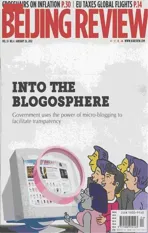MARKET WATCH
2012-12-21本刊编辑部
MARKET WATCH
OPINION
Responsible SOEs
According to the 2011 annual report of China National Offshore Oil Corp. (CNOOC),China’s largest offshore oil producer, all executive directors of the board in CNOOC voluntarily gave up their salary, subsidy,welfare and annual performance bonus, as did three independent non-executive directors.
CNOOC’s board of directors’ willingness to give up millions of yuan shows a sense of responsibility, but it also re fl ects that Chinese state-owned enterprises (SOEs) are now shouldering too little responsibilities since most companies would be unwilling to take similar actions.
What does responsibility mean to SOE managers? Besides safe productions, there are two other elements.
First, different from privately owned enterprises, SOEs are public property and managers should improve their transparency.
For instance, SOE employees usually earn much more than their peers at other companies in the same sector. The public has the right to know how SOEs’ salary system is made.
Also, SOEs have to explain their cost control efforts. Although some SOEs are listed companies, they have a long way to go in terms of transparency, causing dissatisfaction in society.
Second, SOE managers’ responsibilities are not reflected in how much money SOEs have donated or how much salary the managers have given up.
Instead, they depend on how SOEs are treated as public property. This means SOE managers have to operate the companies well and the proportion of pro fi ts that SOEs have to hand in to the country must be increased.
For long, the government has taken a too small proportion of profits from SOEs, and their public service function is not re fl ected.
Take CNOOC for example. Despite being a Hong Kong-listed company, its sales revenue and net pro fi t are to a large extent attributed to the monopolized resources that the country has given to it.
CNOOC’s net profit in 2011 stood at 70.26 billion yuan ($11.15 billion). If 20-30 percent of the pro fi t was handed in to the government, 14 billion yuan to 20 billion yuan ($2.22 billion-$3.17 billion) more fi scal revenue can be used for social construction.
Giving up millions of yuan of salary is good to improve their images but truly responsible SOE managers shouldn’t be obstacles for turning the profit over to the government. They should fi gure out the position of SOEs and themselves in society and deal with the relationship between SOEs and social welfare. In this way the contradiction between SOE development and public interests can be reconciled.
In terms of the SOE payment system and the proportion of profits that SOEs should hand in to the government, the fi nal say does not belong to SOE managers but the government. In terms of SOE reform, government departments should take out more resolution and make more efforts.
THE MARKETS
Mobile Shopping
China’s online grocery giant Yihaodian launched a virtual store mobile application focusing on baby products on April 16, the fi rst of its kind in China. Customers will be able to order diapers and baby formula more conveniently with a special app on their mobile phones.
“With the increasing number of urban parents who don’t have much time to shop in stores, mobile e-commence can help them shop for baby products,” said Pan Qi, Vice President of Marketing of Yihaodian.
Yihaodian sales rose to 2.7 billion yuan($428.76 million) in 2011, from 805 million yuan ($127.83 million) in 2010.
The great business potential attracted attention worldwide. Earlier this year, U.S.retail giant Walmart increased its stake in Yihaodian to 51 percent in order to boost its online presence in China.
Business Reshuffle
Oil giant Sinopec Group is reshuffling its businesses and making preparations for an initial public offering (IPO) in Hong Kong.
Sinopec’s restructuring started as early as February. Oil logistics and re fi ning have become the fi rst two sectors to be combined, said Huang Wensheng, spokesman of Sinopec.
In mid-2012, Sinopec will fi nish consolidating its eight subsidiary construction companies into a new group, reportedChina Dailyciting a source close to Sinopec.
The balance sheets of the eight companies have been merged to meet what is required for an IPO in Hong Kong, said the source.
